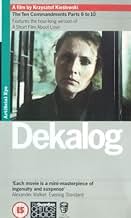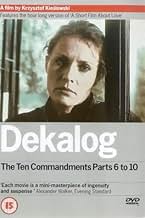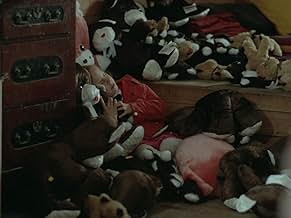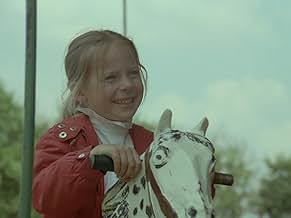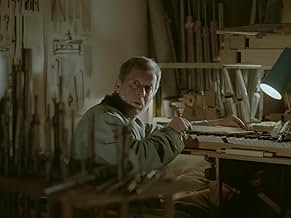Dekalog, siedem
- Episode aired Jun 15, 1990
- TV-MA
- 57m
IMDb RATING
7.8/10
4.2K
YOUR RATING
Raised as sisters, one is in fact the other's mother. Unwilling to continue living a lie, the mother tries to get her daughter back from her parents.Raised as sisters, one is in fact the other's mother. Unwilling to continue living a lie, the mother tries to get her daughter back from her parents.Raised as sisters, one is in fact the other's mother. Unwilling to continue living a lie, the mother tries to get her daughter back from her parents.
- Director
- Writers
- Stars
- Director
- Writers
- All cast & crew
- Production, box office & more at IMDbPro
7.84.1K
1
2
3
4
5
6
7
8
9
10
Featured reviews
about motherhood
...or past. Or fear. Or acceptance. Or loneliness. Each road works. For the great art of detail, impeccable cinematography, a story remaining, after 30 years, more contemporary than in 1989 and, sure, for the genius to tell the right story about viewer. A young woman . Her parents. Her sister who is , in fact, her daughter. A desire. And a choice. Having as axis a word. A hug. And the clash against the truth becoming clear only when you discover yourself. An episode reminding to me few Romanian films under Communism. A film about motherhood, selfishness and, maybe, about the essence of freedom. After the broke of childhood.
Decalogue 7 : Polish director Kieslowski gave us all an excellent lesson in parenting.
In Decalogue 7, some tough questions are asked by Kieslowski about parenting especially the roles played by both a father as well as a mother. This film is told through the tough life of Ania-a young girl raised by her real grand mother Ewa, who does not know that in reality Majka is her real mother. As the film develops, audiences are bombarded with tough ethical as well as moral questions. Who is the real mother to a child ? The woman who gives "biological birth" to a child or a woman who is merely better at looking after a child. These questions make a lot of sense for Ania as it is not her mother Majka but grand mother Ewa who is able to allay her fears whenever she wakes up in night due to bad dreams about wolves. Regardless of what one might say, a true woman who has borne a child would always want herself to be addressed as "Maman/Mummy/Mother". She would never appreciate her child calling her by the first name. It is due to this dilemma that Majka is compelled to take Ania with her. This twist in the story raises a simple yet highly complex question : Can one steal what belongs to one self ? The answer is simple. No, one cannot steal what belongs to oneself. One merely needs to ask about one's own belongings if they have gone into other hands. This is the ethical element which Kieslowski must have wanted to present in his film. Like in some other films made by him, Kieslowski is honest as far the portrayal of characters is concerned. In Decalogue 7, the portrayal of men is brutal, frank and honest without any embellishments as men in this short film were mere mute spectators. They are not being able to make much difference in the lives of their daughters. Lastly, what makes this short film a good moving experience is that the maturity level of Ania is very high compared to other girls of her age group.
'Dekalog': Part 7- Possession as human need and temptation and the sanctity of dominion
'Dekalog' is a towering achievement and a televisual masterpiece that puts many feature films to shame, also pulling off a concept of great ambition brilliantly. Although a big admirer of Krzysztof Kieślowski (a gifted director taken from us too early), and who has yet to be disappointed by him, to me 'Dekalog' and 'Three Colours: Red' sees him at his best.
All of 'Dekalog's' episodes have so many great things, and it is an example of none of the lesser episodes being bad. This is testament to the high quality of 'Dekalog' as an overall whole and how brilliant the best episodes are. Episode 7 may not be as good as Episodes 1, 4, 5 and 6, being not quite as eventful or quite as rich thematically, but is still terrific stuff.
Every single one of 'Dekalog's' episodes are exceptionally well made. The production values in Episode 7 are as ever atmosphere-enhancing, beautiful and haunting to look at and fascinating. Many of the images are impossible to forget and enhance the poignant atmosphere. The direction is quietly unobtrusive, intelligently paced and never too heavy, and the music is suitably intricate.
The themes and ideals are used to full potential, and the characters and their relationships and conflicts feel so real and emotionally resonant without being heavy-handed. Despite being based around one of the ten commandments, don't let that put you off, resemblance to religion is relatively scant.
It is not as rich in story as a few of the previous episodes, but the atmosphere is both harrowing and heart-rending, Episode 7 definitely being one of the most poignant 'Dekalog' episodes. The character development and interactions really fascinate and compelling in their realism. The acting is superb as to be expected, with complexity and nuances by the bucket-load.
Concluding this review, not one of the best 'Dekalog' episodes but still terrific. 9/10 Bethany Cox
All of 'Dekalog's' episodes have so many great things, and it is an example of none of the lesser episodes being bad. This is testament to the high quality of 'Dekalog' as an overall whole and how brilliant the best episodes are. Episode 7 may not be as good as Episodes 1, 4, 5 and 6, being not quite as eventful or quite as rich thematically, but is still terrific stuff.
Every single one of 'Dekalog's' episodes are exceptionally well made. The production values in Episode 7 are as ever atmosphere-enhancing, beautiful and haunting to look at and fascinating. Many of the images are impossible to forget and enhance the poignant atmosphere. The direction is quietly unobtrusive, intelligently paced and never too heavy, and the music is suitably intricate.
The themes and ideals are used to full potential, and the characters and their relationships and conflicts feel so real and emotionally resonant without being heavy-handed. Despite being based around one of the ten commandments, don't let that put you off, resemblance to religion is relatively scant.
It is not as rich in story as a few of the previous episodes, but the atmosphere is both harrowing and heart-rending, Episode 7 definitely being one of the most poignant 'Dekalog' episodes. The character development and interactions really fascinate and compelling in their realism. The acting is superb as to be expected, with complexity and nuances by the bucket-load.
Concluding this review, not one of the best 'Dekalog' episodes but still terrific. 9/10 Bethany Cox
Haunting
The young woman in the film has had a child that has been raised by her mother and father. They are judgmental because she was immature and, in their eyes, irresponsible. It is obvious that her stock is greatly diminished at home. So one day, she waits till a children's' play is over and kidnaps her daughter. This is a no win situation. The fact is she is not capable of keeping the child healthy and happy. They are on the run but have no real place to go. This is a sad tale of looking for some kind of independence when that boat has left the dock.
Thou shalt not steal
Dekalog Seven isn't the strongest of the ten, but, like Dekalog Five, Kieslowski takes a fairly straightforward commandment and adds a twist to it. Sure, we may think Majka steal Ania, but, as Majka says, can you really steal something that was yours to begin with? It's an interesting question, and Kieslowski forces you to consider (And ultimately decide) who, Ewa or Majka, is really at fault for stealing Ania. But that's typical Kieslowski. To have a straightforward plot with a cut-and-dry scenario would be far too easy for him, and I've come to expect nothing less from his work. The types of questions he subtly asks the viewer are more important than any moral he could tell us because it forces us to question our own values and morals, instead of being told, and this kind of questioning is why Kieslowski and his works are so highly regarded.
Did you know
- TriviaArtur Barcis, who plays a recurring role in most episodes of Dekalog, was meant to play a man at the railway station, but did not appear in this episode due to technical difficulties.
- ConnectionsReferenced in The Simpsons: Lisa's First Word (1992)
Details
Contribute to this page
Suggest an edit or add missing content


